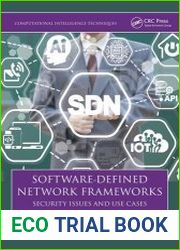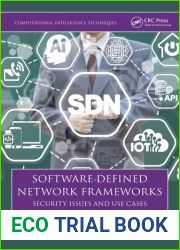
BOOKS - Software-Defined Network Frameworks Security Issues and Use Cases

Software-Defined Network Frameworks Security Issues and Use Cases
Author: Mandeep Kaur, Vishal Jain, Parma Nand
Year: 2024
Pages: 325
Format: PDF
File size: 13.8 MB
Language: ENG

Year: 2024
Pages: 325
Format: PDF
File size: 13.8 MB
Language: ENG

The book "SoftwareDefined Network Frameworks Security Issues and Use Cases" explores the challenges and opportunities of software-defined networking (SDN) from a security perspective. The authors examine the potential risks and vulnerabilities associated with SDN and provide practical guidance on how to mitigate them. They also discuss the benefits of SDN and its potential impact on network security. The book begins by defining SDN and its key components, including the control plane and data plane, and explains how these components interact to manage network traffic. The authors then delve into the security issues that arise when implementing SDN, such as the potential for distributed denial-of-service attacks and the need for robust access control mechanisms. They also discuss the importance of securing the control plane and data plane, as well as the need for secure communication between these planes. One of the main themes of the book is the need for a comprehensive approach to SDN security. The authors argue that security cannot be an afterthought, but rather must be integrated into every stage of SDN development and deployment. This includes designing secure SDN architectures, implementing secure protocols and APIs, and conducting thorough testing and validation. The book also emphasizes the importance of ongoing monitoring and analysis to ensure that SDN systems remain secure over time. The authors also explore the use cases for SDN in various industries, such as telecommunications, finance, and healthcare. They highlight the potential benefits of SDN in these industries, such as increased agility, scalability, and cost savings, while also acknowledging the unique security challenges that arise in each context.
''
















































